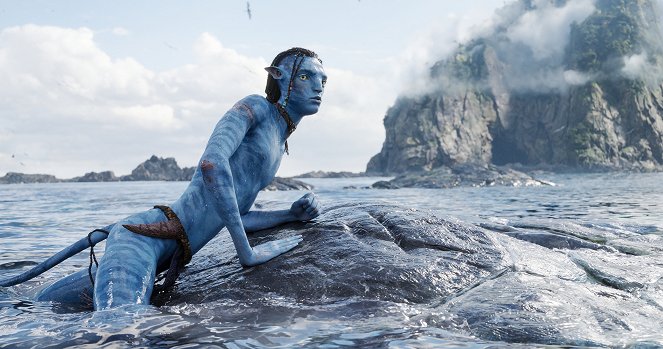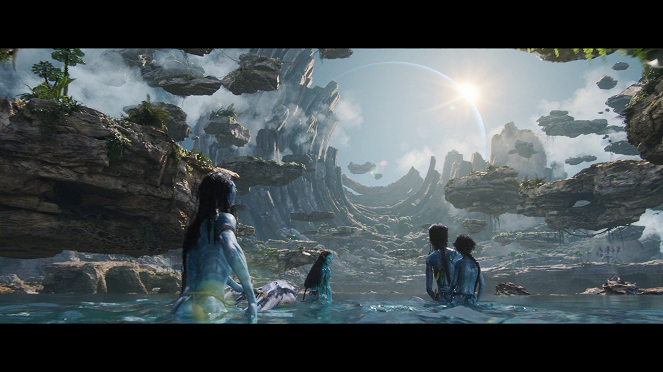Realização:
James CameronCâmara:
Russell CarpenterMúsica:
Simon FranglenElenco:
Sam Worthington, Zoe Saldana, Sigourney Weaver, Stephen Lang, Kate Winslet, Cliff Curtis, Joel David Moore, CCH Pounder, Edie Falco, Brendan Cowell (mais)Streaming (4)
Conteúdos(1)
Set more than a decade after the events of the first film, Avatar: The Way of Water begins to tell the story of the Sully family (Jake, Neytiri, and their kids), the trouble that follows them, the lengths they go to keep each other safe, the battles they fight to stay alive, and the tragedies they endure. (20th Century Studios)
Vídeos (12)
Críticas (11)
A escrita de argumentos de uma série de televisão medíocre que não se apressa a nenhum lado. Não só a história pode ser resumida numa frase curta novamente, como é a mesma da última vez e parece que a próxima vez não será diferente. O movimento artificial dos lagartos azuis em terra não mudou desde «Pilot». Faz com que metade do filme pareça uma versão de demo de um jogo de vídeo. No entanto, entrar debaixo de água é uma grande evolução. Os lagartos nadam muito mais lindamente do que andam e saltam, e James Cameron dá uma vida sem precedentes aos animais e flora subaquáticos fictícios. É bela e mágica. Luc Besson alegrar-se-á. Também é dado espaço aos caracteres humanos na água, oferecendo a um assunto artificial digital a energia mais física. Todos aqueles submarinos, caranguejos mecânicos e geralmente cenas de «caça à baleia» de vilões são muito fixes. Vão lembrar ao público a alegria juvenil de ação em Waterworld. Mas no fim de contas, o fenómeno de Avatar torna-se mais um passeio de parque de diversões (com a promessa de um futuro de VR) do que uma obra-prima cinematográfica no verdadeiro sentido da palavra. Uma espécie de Marvel de Cameron com fraco desenvolvimento de caracteres. O que é de uma certa maneira uma pena.
()
What is the recipe for the success of Cameron’s films? As in the case of Pixar’s top projects and all of Hayao Miyazaki’s movies, there is no secret to it; on the contrary, it is banally uncomplicated, though not simple or obvious. Cameron creates fantasy worlds with the ambition to maximise the viewers’ immersion in them and he achieves this by being absolutely demanding and making no comprises. Cameron’s essential asset as a master director is his complete understanding of the technological possibilities of the medium and his ability to push those possibilities in a visionary way. But what receives little emphasis is the fact that Cameron subordinates to this immersion not only the demands of executing the special effects, but primarily his formalistic signature. He doesn’t create money shots, fool around with the camerawork or editing, show off with flashy long shots or otherwise let the film exhibit itself to the audience. When he goes for a slow-motion shot, he does so in the interest of working with the dynamics and build-up of the whole sequence, not with the aim of making a cool picture. That doesn’t mean that he doesn’t set challenges for himself. His films contain a lot of difficult shots and each of his projects is actually a major campaign with the objective of conquering new territory for cinema as a medium of illusion. But, again, all efforts remain subordinate to the audience’s immersion in the given world he has created. This maxim also guarantees that the narrative isn’t cluttered with anything that would break the fourth wall, whether references nodding at fans or characters and artefacts that serve only as intrusive advertisements for associated merch. Unlike Star Wars and the Marvel movies, Cameron’s films don’t offer corporate-calculated webs of stories that would lend themselves to fandom fetishisation. Instead, Cameron simply creates fictional worlds that entice viewers with their fantastical nature and the promise of their settings and characters. Cameron himself says that his screenwriting process comes from two directions. On the one hand, there are the characters and their relationships. On the other hand, there are the specific scenes and settings that Cameron would like to see. Writing the screenplay then involves coming up with motivations and peripeteias that connect these two pillars causally and logically. Then, of course, there is Cameron’s own imagination, which shapes the particular worlds. And that’s all; there is nothing else behind his success (well, except for effective PR, which in turn relies on the potential that Cameron creates). It then invites further reflection on what it says about the state of blockbusters and Hollywood as a whole when the above is not the norm but a celebrated anomaly. ______ In light of the above, the only weakness of Cameron’s films is his screenplays. Or perhaps it’s only the perspective of viewers who aren’t completely captivated by them. Compared to the first Avatar, the narrative shifts in the sequel may not sit well with some viewers. Conversely, some will be irritated by the excessive similarity between the two films and the repetition of motifs. Still others will have an issue with the apparent lapses in logic (even if they are transgressions against the opinions of the respective viewers and not against the rules of fiction). Other people won’t be able to get past the wall of their own cynicism and accept the new-age environmental ethos, naïve mythmaking, post-colonial romanticism or Cameron’s characteristic melodrama. Personally, I was saddened mainly by the evoked impression that I had already seen several times. For one thing, Cameron again builds on the first film’s love story with the story of a family on the run and a coming-of-age motif, just as he did with Terminator 2. The story of parental love that turns into anxious criticalness and the necessity of giving adolescents their freedom regardless of what mistakes they make as a result because they can grow only by making those mistakes fortunately remains universal and fundamental enough not to seem derivative. Furthermore, its likable in that it irritates the parents in the audience and appeals greatly to younger viewers. Apart from that, however, memories of key sequences in Titanic and The Abyss inevitably creep into one’s mind at particular moments in the film. On the other hand, the idea that Cameron is merely ripping himself off can be quickly dispelled by recalling the work of George Miller, who also works with variations on certain motifs in the Mad Max films. Cameron also uses similar situations simply because he likes them, knows their dramatic potential and enjoys recreating them. ______ After all, personal passion and imprinting one’s signature on a film are essential attributes of a director’s work. Cameron most clearly projects into his films his often mentioned fascination with strong women and warrior mothers, as well as his fascination with the undersea world. With respect to the latter, the second Avatar is perhaps his most inward-looking project since The Abyss. In multiple storylines, he expresses the desire to merge with that alien world which is so close, actually within reach, but the limits of the human body constantly make its strangeness and unattainability felt.
()
(menos)
(mais)
I like how every plot shift is tied to familial relationships (as family comprises the whole ecosystem of Pandora in this case), how the film works superbly with parallels (between the characters’ relationships and the past and present – the villain goes through the same initiation as Jake in the first film, but with a different result) and how divine the water and underwater CGI looks, and I’m not offended by the simple eco-friendly plot about finding a home and saving one’s family through a connection to an ancestral heritage, but Cameron is far too enamoured with his moon/planet and his singing whales, and he revels in both of these aspects far more than is necessary for the narrative. You can imagine the middle part of the film, which is followed by the comparatively interminable final act, as a sequel to My Octopus Teacher, with big fish instead of octopuses (which I don't mean as a compliment). Whereas the first Avatar flew by quickly and, due to its focus on building a fictional world and evoking fear for its fate, you weren’t bothered by the two-dimensional characters communicating through poorly written dialogue, here I felt every minute passing by, missing the mark emotionally by several nautical miles, because when the going gets tough, you will probably have trouble even remembering the name of the character whose life is at stake. At least the protagonist’s sons are similar to each other and interchangeable in terms of character. An unbearably long three hours. P.S. Some of the action scenes in 3D and 48fps look like cut scenes from a highly advanced video game (which is not a compliment either) and the non-action scenes are reminiscent of a soap opera. 60%
()
James Cameron once again shows Hollywood who is the king of blockbuster movies. Despite its three-hour running time, Avatar 2 is entertaining from beginning to end, with breathtaking audiovisual and personal stories of old and new heroes at the ideal pace. Pandora is perhaps even more beautiful than last time, the newcomers are likeable, and Cameron keeps the pace from start to finish without a single flinch. And after thirteen years, he shows that he's still a long way ahead of most Hollywood filmmakers.
()
Less water, man, less water! I’m still a big fan of the first Avatar, which worked like a euphoric trip through another world thanks to its simple narrative structure involving a hero/outsider savior of the noble savages. The second one is essentially a drawn-out and shaky soap opera about a family run by a militant father who moves to a new ’hood and can’t get used to it. Let’s leave aside that Cameron paid significantly less attention to dramatic motivations than he did to the last fish below the surface. The whole film thus seems irrational and the dialogue, which was never Avatar’s strength, is even more ear-scratchingly pedantic. As an epic tech reel, however, the film is breathtaking and I truly, royally enjoyed the underwater National Geographic in HFR. There is something truly intoxicating in the smoothness and fluidity. Unfortunately, the film’s 192 minutes are emotionally stolen by a crippled humpback whale, which has the significant advantage that it doesn’t talk (and even its retrospective is not told smoothly). Yes, Cameron is a great craftsman and illusionist, but as a storyteller, he fails here significantly in my opinion. There is no development of the mythology to speak of, as everything is just a variation, the metaphor of nature as a loving entity is becoming more and more naïve and, honestly, I would like to spend less time waiting for the third one and the fire people after this aquatherapy. During the screening, I found it difficult to push away the thought that I would have preferred to enjoy some top-quality sci-fi, which Avatar decidedly isn’t!
()
Galeria (80)
Photo © Walt Disney Studios Motion Pictures


